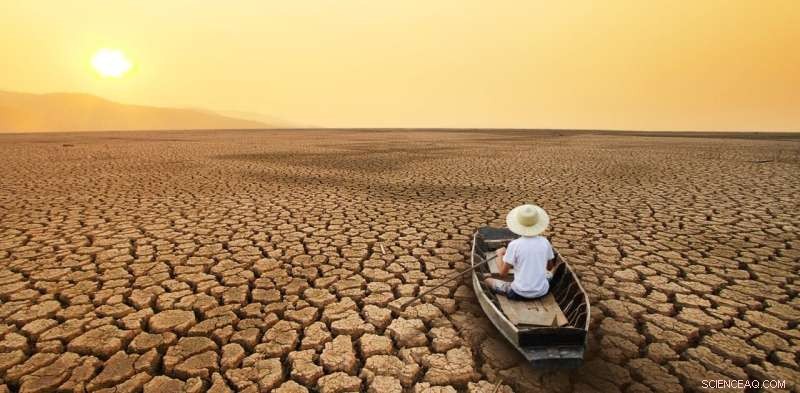
Kredit:Piyaset / shutterstock
Den senaste FN-rapporten om de potentiella effekterna av klimatförändringar ger en dyster dom, med vissa effekter som nu anses oundvikliga. Men det finns också lärdomar om katastrofer och våldsamma konflikter som kan hjälpa till att rädda liv och skapa säkrare samhällen oavsett klimatförändringar orsakade av människor.
Den huvudsakliga tillgängliga texten i rapporten från Intergovernmental Panel on Climate Change (IPCC) om "Impacts, Adaptation and Vulnerability" är en sammanfattning på 35 sidor för beslutsfattare, som enligt IPCC:s regler är godkänd av medlemsstaternas regeringar.
IPCC-forskare utses av medlemsländerna och dessa bidragande forskare producerar inte ny vetenskap. De sammanfattar de tiotusentals referentgranskade vetenskapliga artiklarna om klimatförändringar sedan den tidigare bedömningen (den senaste stora IPCC-rapporten om effekter, anpassning och sårbarheter publicerades 2014).
Forskarna får sedan tusentals granskningskommentarer på utkast som kräver textändringar eller svar. Genom att göra en rad uttalanden om vår förståelse av klimatförändringar tilldelar rapporten konfidensnivåer som "låg" eller "mycket hög" för att indikera hur säkra författarna är på var och en.
Den aktuella rapporten har överskuggats av att ukrainska forskare måste lämna godkännandesessionen för att ta hand om sig själva och sina familjer under Rysslands invasion av deras land. Icke desto mindre skrev ett 90-tal forskare från alla bebodda kontinenter och balanserade mellan kvinnor och män dokumentet. Som ofta förekommer kom rapporter om politiska påtryckningar för att ta bort vetenskapligt innehåll som betonar materialets politiska natur.
Katastrofer och klimatförändringar
Som en akademiker som forskar om katastrofer och hälsa var jag särskilt intresserad av hur rapporten undersökte klimatförändringar som en orsak till katastrofer, inklusive våldsamma konflikter, och beskriver åtgärder för att undvika dem.
IPCC:s sammanfattning undviker helt frasen "naturkatastrof". Detta återspeglar årtionden av arbete som förklarar att katastrofer orsakas av källor till sårbarhet – som ojämlik och orättvis tillgång till viktiga tjänster som hälsovård eller dåligt utformad eller byggd infrastruktur som kraftverk – snarare än av klimatet eller andra miljöpåverkan.
Rapporten säger, med stor tillförsikt, att "klimatförändringarna bidrar till humanitära kriser där klimatfaror samverkar med hög sårbarhet." Med andra ord måste sårbarhet finnas innan en kris kan uppstå. Klimatförändringarna är inte grundorsaken till katastrofer. The report explains that places with "poverty, governance challenges and limited access to basic services and resources, violent conflict and high levels of climate-sensitive livelihoods" are more vulnerable to climate change impacts.

Mozambique is one of the world’s most vulnerable countries, according to the Climate Risk Index. Credit:fivepointsix / shutterstock
For example, cyclones still lead to disasters in Bangladesh. Nevertheless, the country has substantially reduced deaths and damage through concerted efforts to reduce vulnerabilities. These include building thousands of storm shelters and issuing early warnings by multiple means. These measures have made cyclones less deadly even as the storms have become more intense due to climate change.
Weather disasters which kill more people tend to occur where communities and infrastructure are more vulnerable, according to the report. Heat is rightly highlighted as a major concern, since it causes crops to fail and forces people to halt work. That said, it is surprising that the health impacts of humidity, which can combine with extreme heat to deadly effect, are not mentioned.
The report explains that disaster risk and impacts can be reduced by tackling fundamental issues which cause vulnerability, no matter what the weather and climate do. It places high confidence in risk management, risk sharing, and warning strategies as key tasks for adapting to climate change.
Violent conflict and climate change
As with disasters, the report cannot attribute violent conflict to climate change. With high confidence, the report states that "compared to other socioeconomic factors the influence of climate on conflict is assessed as relatively weak." This corroborates other research which argues peace and conflict are more determined by social and political factors than by climate or weather.
The authors identify, with high confidence, actions to reduce the "underlying vulnerabilities" which raise the risk of violent conflict. These can be based on research and might include redistributing wealth and resources to make societies more equal and equitable, while providing diverse livelihoods. Adapting to climate change is only part of the solution. Scientific analyses note how development, rather than climate change adaptation only, is the most effective overall.
In fact, despite frequent assumptions that climate change caused or was linked to violent conflicts in the past, the summary implies that no single conflict should be attributed to climate change, natural or anthropogenic. This conclusion matches analyses for Darfur in 2003 and Syria in 2011.
Summary of the summary
The IPCC's press release on the new report was headlined "Climate change:a threat to human wellbeing and health of the planet." Its stark opening detailed "dangerous and widespread disruption." Yet its subtitle, "Taking action now can secure our future," needs emphasizing. This is particularly the case for disasters and violent conflicts which, the summary document states with high confidence, are not significantly influenced by human-caused climate change.
Perhaps the press release mentions neither disasters nor violent conflict because they represent comparatively positive news among the bleakness. Ultimately, "taking action now" means applying the science of disasters and conflict for prevention. Then, we save lives and livelihoods, no matter what climate change does.